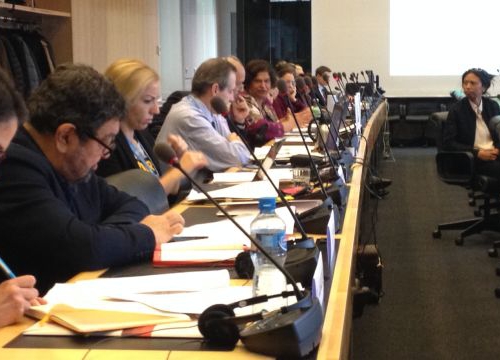Members of United Nations Treaty Bodies Discuss the Simplified Reporting Procedure


Geneva Academy
20 December 2018
On 10-11 December 2019, members of United Nations (UN) treaty bodies (TBs), as well as representatives of the Office of the UN High Commissioner for Human Rights (OHCHR) and the Geneva Academy discussed the so-called simplified reporting procedure (SRP).
This discussion happened at an important moment, as most TBs are only starting to use this procedure. Harmonization will, therefore, be easier as no practice has been firmly established regarding SRP.
Towards a Common Approach
Approaches towards the SRP are disparate. The workshop, co-organized with OHCHR, allowed sharing experiences, identifying good practices, as well as possible elements of a common procedure for all TBs.
‘A common approach to the SRP would facilitate access to the system by its users. States would report in the same manner to all TBs concerned, while National Human Rights Institutions and NGOs would be able to better prepare for the reviews knowing that all TBs function the same way. A harmonized way of reporting via the SRP would also provide an important step towards a coordinated approach to reporting, as pointed out in our report of The Academic Platform on Treaty Body Review 2020’ stresses Felix Kirchmeier, Coordinator of the Geneva Human Rights Platform at the Geneva Academy.
Criteria, Implementation, Content and Methodology
The discussion also addressed the criteria for using the simplified reporting procedure, implementation of the procedure by making it the default procedure, and the development of a common methodology and deadlines.
‘Engaging across almost all Committees on this issue covering all rights with a varying number of states which have ratified different treaties is no easy feat. However, all participants stepped up to the challenge and showed a real commitment to ensuring the SRP works for all stakeholders including victims which must hold primacy of place. States also have an obligation to show their commitment by ensuring that the TB system had the adequate resources to implement the international legal obligations’ underlines Orest Nowosad, Chief of Section at the TB Branch of OHCHR.
Integrating Views from Civil Society
Representatives from civil society organizations joined the discussion during the workshop’s session that addressed the information that should be taken into consideration in the simplified reporting procedure and the effective participation of civil society and National Human Rights Institutions.
‘The SRP shifts the entry points for NGOs to the UN TB system. It is therefore crucial that NGOs know when to engage and to submit information – namely at the moment of the elaboration of the “list of issues” by the Committees. While the process seems more technical, it actually offers an additional entry point for civil society to have their concerns heard’ explains Felix Kirchmeier
Informing the Annual Meeting of Chairpersons
The report of the workshop will provide the basis for a secretariat note informing the discussion on the SRP at the next annual meeting of Chairpersons of UN TBs. The report will also be discussed by the various TBs in plenary to encourage them to take decisions on moving forward in a coordinated manner.
‘In light of the upcoming review of TBs by the UN General Assembly, it will be important that TBs show the progress they are making internally towards harmonizing the system’ recalls Felix Kirchmeier









